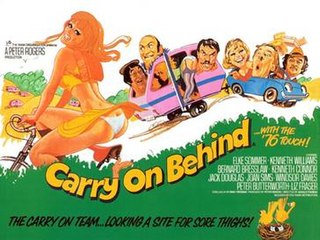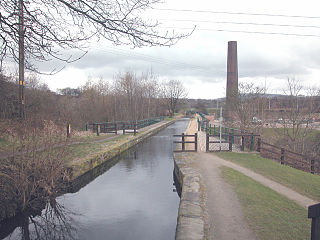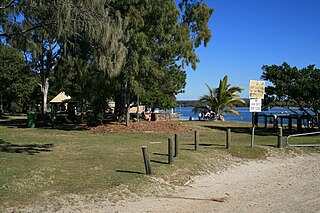
Camping is an outdoor activity involving overnight stays away from home in a shelter, such as a tent or a recreational vehicle. Typically participants leave developed areas to spend time outdoors in more natural ones in pursuit of activities providing them enjoyment. To be regarded as "camping" a minimum of one night is spent outdoors, distinguishing it from day-tripping, picnicking, and other similarly short-term recreational activities. Camping can be enjoyed through all four seasons.

A campsite or camping pitch is a place used for overnight stay in an outdoor area. In UK English, a campsite is an area, usually divided into a number of pitches, where people can camp overnight using tents or camper vans or caravans; this UK English use of the word is synonymous with the US English expression campground. In American English, the term campsite generally means an area where an individual, family, group, or military unit can pitch a tent or park a camper; a campground may contain many campsites.

A caravan, travel trailer, camper or camper trailer is towed behind a road vehicle to provide a place to sleep which is more comfortable and protected than a tent. It provides the means for people to have their own home on a journey or a vacation, without relying on a motel or hotel, and enables them to stay in places where none is available. However, in some countries campers are restricted to designated sites for which fees are payable.

Carry On Behind is a 1975 British comedy film, the 27th release in the series of 31 Carry On films (1958–1992). It was the first not to be scripted by Talbot Rothwell since Carry On Cruising 13 years previously. Also missing was series stalwart Sid James. James was busy touring in a play, while Rothwell's health prevented him from writing. The regular actors present are Kenneth Williams, Kenneth Connor, Jack Douglas, Joan Sims and Peter Butterworth, Bernard Bresslaw and Patsy Rowlands. Carry On Behind was the final picture in the series for Bresslaw and Rowlands as well as Carol Hawkins. It saw the only appearances of Elke Sommer, Adrienne Posta, Sherrie Hewson and Ian Lavender in a Carry On film, and was the first of two entries in the series for Windsor Davies.

Shell Island, also known as Mochras, is a peninsula lying west of Llanbedr in Gwynedd, Wales. It was formed after the River Artro was diverted by the Earl of Winchelsey in 1819 from its previous course where it entered the sea to the south of Shell Island. Prior to this, access to the ancient settlement on the island would have been through the village of Llandanwg, which is now across the estuary.

A portable toilet or mobile toilet is a toilet that may easily be moved around. They may be toilets that can be brought on site, such as a festival, concert or building site, to quickly provide sanitation services. Others may be toilets within mobile vehicles, such as boats or caravans. Some are re-usable and may be moved on to further sites, others are easily installed but become permanent once in place. A major characteristic is that most types do not require any pre-existing services to be provided on-site, such as sewerage disposal, but are completely self-contained.

IEC 60309 is a series of international standards from the International Electrotechnical Commission (IEC) for "plugs, socket-outlets and couplers for industrial purposes". The maximum voltage allowed by the standard is 1000 V DC or AC; the maximum current, 800 A; and the maximum frequency, 500 Hz. The ambient temperature range is −25 °C to 40 °C.

A recreational vehicle park or caravan park is a place where people with recreational vehicles can stay overnight, or longer, in allotted spaces known as "sites" or "campsites". They are also referred to as campgrounds, though a true campground also provides facilities for tent camping; many facilities calling themselves "RV parks" also offer tent camping or cabins with limited facilities.
The Caravan and Motorhome Club is an organisation representing caravan and motorhome users in the United Kingdom and Ireland. It was founded in 1907 and now represents nearly three-quarter of a million members.

Adgestone is a small hamlet on the Isle of Wight. It is located close to Brading in the east of the island.
Mark Hammerton Group Ltd was a UK-based travel organiser and travel publisher specialising in camping, caravanning, motorhome and mobile home holidays on campsites in France, Spain, Italy and other European countries. The Group published the market-leading Alan Rogers campsites guides and offered a European travel service for readers including ferry bookings. The Group was acquired by The Caravan Club in 2012 under the brand Alan Rogers Travel Group, along with its subsidiary company Belle France, which offers walking and cycling hotel holidays.

The Alan Rogers Guides were started in Britain in 1968 by camp enthusiast Alan Rogers. The guides place utmost importance on the quality of the campsites; campsites cannot pay to be in the guide. Travel guides have been published every year since 1968. In 2018, Alan Rogers Guides celebrated its 50th anniversary.

Burrs Country Park covers a 36 hectare site located on the banks of the River Irwell, 1.5 km north west of Bury, Greater Manchester. It was acquired by Bury Metropolitan Borough Council in 1986 and transformed from a derelict industrial site into a modern country park. Access to the park which is open all year round is via Woodhill Road.

The Camping and Caravanning Club is a United Kingdom not-for-profit organisation involved with all aspects of camping based in the United Kingdom. Founded in 1901, the club now represents over half a million members.
Alan Rogers Travel Group was formed in 2012 following the purchase of various brands from the former Mark Hammerton Group Ltd by The Caravan Club.
Sondern is a village in Olpe district, in North Rhine-Westphalia, Germany. As of 2011 it had a population of 484 people. It contains a leisure complex and campsite on the shores of a lake.

Tripcony Hibiscus Caravan Park is a heritage-listed caravan park at Bowman Road, Caloundra CBD, Sunshine Coast Region, Queensland, Australia. It was built from 1912 onwards. It was added to the Queensland Heritage Register on 3 April 2009.

Cotton Tree Caravan Park is a heritage-listed caravan park at Cotton Tree Parade, Cotton Tree, Sunshine Coast Region, Queensland, Australia. It was added to the Queensland Heritage Register on 3 April 2009.
Thrybergh Country Park is a reservoir and nature reserve in South Yorkshire. It is located between Thrybergh and Hooton Roberts on the outskirts of Rotherham and opened in 1983.

Noosa River Caravan Park is a heritage-listed caravan park at Russell Street, Noosaville, Shire of Noosa, Queensland, Australia. It was built from 1929 onwards. It was added to the Queensland Heritage Register on 3 April 2009.














